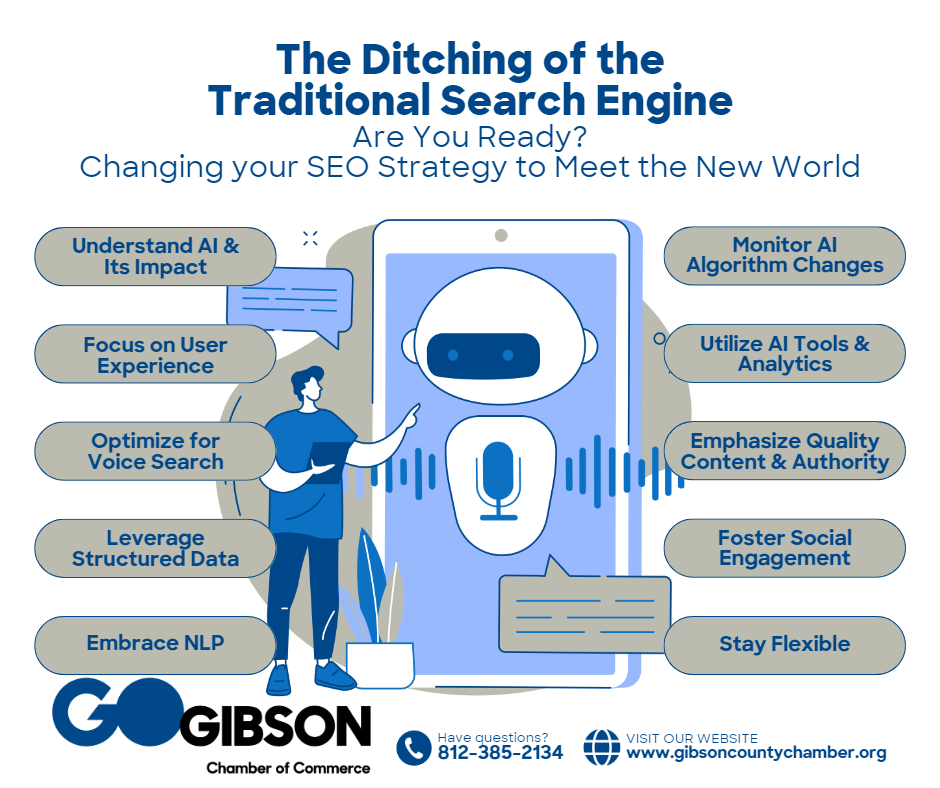
The Ditching of the Traditional Search Engine
Are you Ready?
 AI chatbots on social media platforms are significantly changing the way search functions and the overall search experience. To prepare your business for the changes that AI is bringing to search and SEO, you need to do the following:
AI chatbots on social media platforms are significantly changing the way search functions and the overall search experience. To prepare your business for the changes that AI is bringing to search and SEO, you need to do the following:
Understand AI and Its Impact
Learn about AI technologies, how they are being applied in search and SEO, and the potential implications for your business. Stay updated on the latest advancements and trends in AI to make informed decisions.
Focus on User Experience
AI-driven search algorithms prioritize user experience. Ensure your website provides a seamless and intuitive user experience, with fast loading times, mobile optimization, and easy navigation. Create high-quality, relevant content that meets user needs and engages your target audience.
Optimize for Voice Search
Voice search is going gangbusters now largely due to AI-powered voice assistants. Optimize your website and content for voice search by using conversational language, long-tail keywords, and structured data markup. Consider the context in which users may ask questions verbally and provide concise and direct answers. Not sure how your target market would search for you? Ask them and use as close to their natural language as possible.
Leverage Structured Data
AI algorithms rely on structured data to understand and categorize information on websites. Implement structured data markup, to provide search engines with additional context about your content. This can enhance your visibility in search results and improve the chances of appearing in rich snippets or other AI-powered search features.
Embrace Natural Language Processing (NLP)
AI algorithms are becoming more proficient at understanding natural language. Incorporate natural language and semantic SEO strategies into your content creation and optimization efforts. Use relevant keywords, synonyms, and related terms to improve the contextual relevance of your content.
Monitor AI Algorithm Changes
Major search engines often release updates that impact search rankings. Stay informed through industry publications and sites (like Search Engine Journal and Marketing AI Institute), webmaster forums, and official announcements to adapt your SEO strategies accordingly.
Utilize AI Tools and Analytics
Take advantage of AI-powered tools and analytics platforms to help analyze data, identify trends, and optimize your SEO efforts. These tools can provide valuable insights into user behavior, keyword performance, content optimization, and competitor analysis.
Emphasize Quality Content and Authority
AI algorithms increasingly prioritize high-quality, authoritative content. Focus on creating comprehensive, well-researched, and valuable content that establishes your expertise and addresses user needs. Invest in building your brand reputation through thought leadership, guest blogging, and collaborations with industry influencers.
Foster Social Engagement
AI algorithms consider social signals in their ranking algorithms. Encourage social sharing, engagement, and reviews for your content and brand. Build a strong social media presence and leverage social media platforms to amplify your content and connect with your target audience.
Stay Flexible
AI technologies and search algorithms evolve constantly. Stay agile and adaptive in your SEO strategies. Continuously monitor and analyze your SEO performance, adapt to algorithm changes, and experiment with new techniques and tactics as the search landscape evolves.